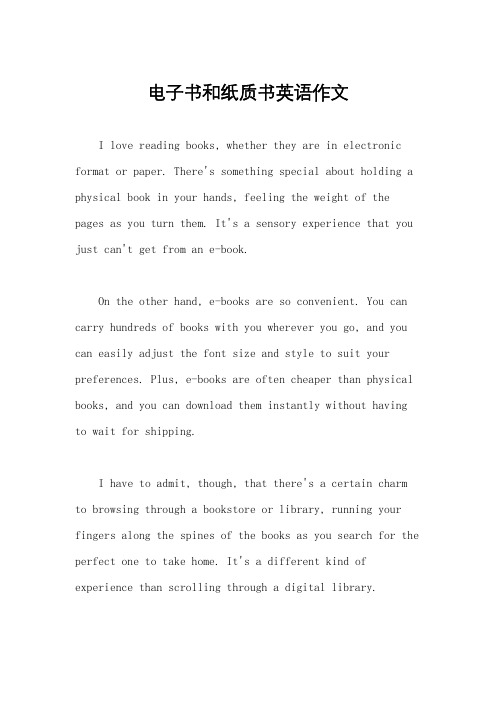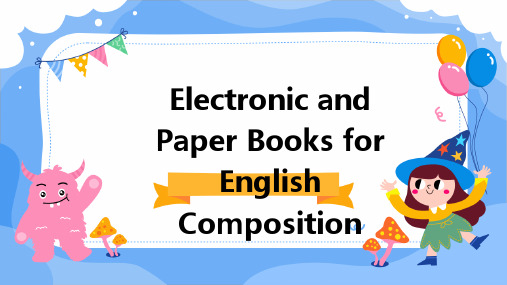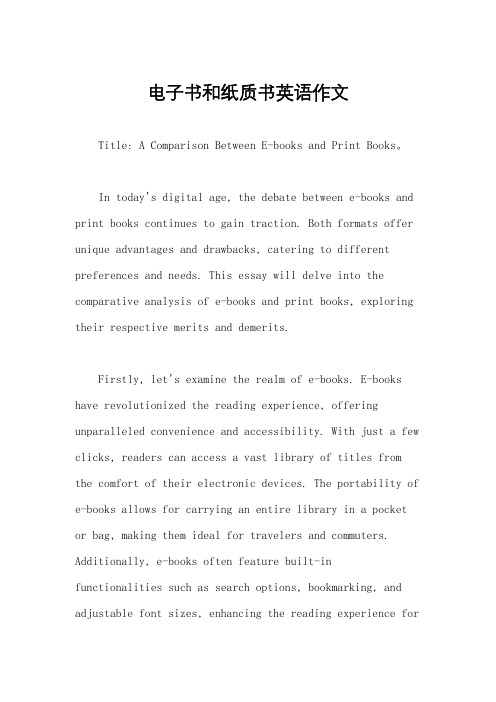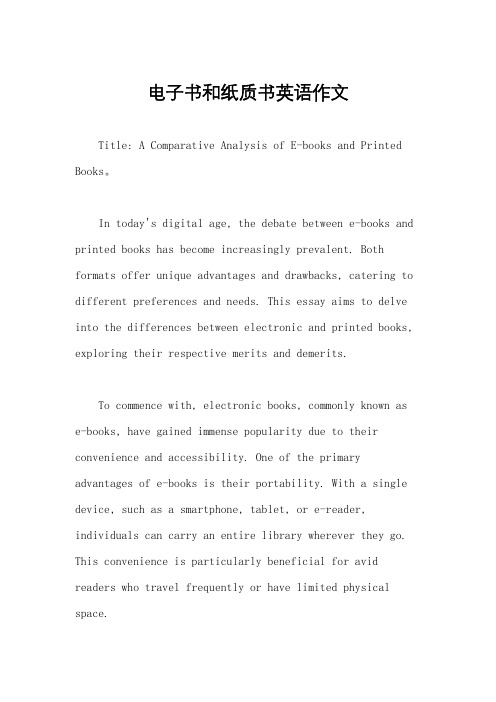英语作业-纸质书和电子书
电子书和纸质书英语作文

电子书和纸质书英语作文I love reading books, whether they are in electronic format or paper. There's something special about holding a physical book in your hands, feeling the weight of the pages as you turn them. It's a sensory experience that you just can't get from an e-book.On the other hand, e-books are so convenient. You can carry hundreds of books with you wherever you go, and you can easily adjust the font size and style to suit your preferences. Plus, e-books are often cheaper than physical books, and you can download them instantly without having to wait for shipping.I have to admit, though, that there's a certain charm to browsing through a bookstore or library, running your fingers along the spines of the books as you search for the perfect one to take home. It's a different kind of experience than scrolling through a digital library.At the end of the day, whether it's an e-book or a paper book, the most important thing is the content. As long as the story or information is engaging and well-written, it doesn't really matter what format it comes in. So, I'll continue to enjoy both electronic and paper books for their own unique qualities.。
电子书和纸质书英语作文

电子书和纸质书英语作文Title: A Comparative Analysis: E-books versus Printed Books。
In the digital age, the debate between e-books and printed books continues to spark discussions among avid readers and scholars alike. Both mediums offer unique advantages and drawbacks, catering to different preferences and needs. This essay delves into the comparison between e-books and printed books, examining their impact on reading experiences, accessibility, environmental concerns, and cultural significance.Firstly, let's explore the reading experience provided by each medium. E-books, with their portability and convenience, have revolutionized the way people access literature. With just a few taps on a screen, readers can carry an entire library in their pocket, enabling them to read anytime, anywhere. Additionally, e-readers often offer features like adjustable font sizes and built-indictionaries, enhancing readability and comprehension for users. On the other hand, printed books provide a tactile experience that many readers find irreplaceable. The smellof ink on paper, the satisfaction of turning physical pages, and the visual appeal of a well-designed cover contributeto the immersive experience of reading a printed book. For some, nothing can compare to the sensation of holding a tangible book in their hands.Accessibility is another crucial aspect to consider. E-books have democratized access to literature by eliminating barriers such as geographical distance and availability. With an internet connection, readers can instantly download a wide range of titles, including rare or out-of-print books. This accessibility is especially beneficial for individuals with disabilities, as e-books can be easily customized to accommodate different needs, such asadjustable font sizes and audio narration. Conversely, printed books may be less accessible in certain regions orto individuals with mobility challenges. However, printed books have the advantage of not requiring electronicdevices or batteries, making them accessible even in remoteareas without electricity or internet connectivity.Environmental considerations also come into play when comparing e-books and printed books. E-books are often touted as a more eco-friendly option due to their digital nature, which eliminates the need for paper production and transportation. By reducing paper consumption, e-books contribute to forest conservation and minimize carbon emissions associated with the printing industry. Furthermore, e-books eliminate the environmental impact of book disposal, as digital files do not contribute tolandfill waste. However, it's essential to acknowledge that e-readers and electronic devices have their own environmental footprint, stemming from manufacturing, energy consumption, and electronic waste disposal. Printed books, while requiring paper production, can be more sustainable if sourced from responsibly managed forests and recycled materials. Additionally, printed books hold cultural significance as tangible artifacts of humanhistory and creativity.In conclusion, the debate between e-books and printedbooks reflects the evolving landscape of reading in the digital age. Both mediums offer unique advantages and contribute to the rich tapestry of literary culture. Ultimately, the choice between e-books and printed books depends on individual preferences, reading habits, and values. Whether one prefers the convenience of e-books or the sensory experience of printed books, both mediums playa vital role in fostering literacy, knowledge dissemination, and cultural enrichment.。
英语作文之电子书与纸质书

01
Comparison between e-books and paper ce
E-books
Easy to navigate: With e-books, you can quickly jump to any page, search for specific terms, and bookmark your favorite sections
Environment protection
E-books help reduce paper consumption, so reducing the
environmental impact of paper production
E-books save space, as they are stored digitally and do not occupy physical space like
Portability
Easy to store
Paper books can be stacked or stored in books, making it easy to access your collection at any time
Better for the environment
E-books can be annotated, highlighted, and bookmarked for
easy reference and review
E-books can be synchronized across multiple devices, making it convenient to access and read on
Adjustable font size and brightness: E-books allow you to customize the font size and screen brightness to suit your reading preferences
电子书和纸质书英语作文

电子书和纸质书英语作文Title: A Comparison Between E-books and Print Books。
In today's digital age, the debate between e-books and print books continues to gain traction. Both formats offer unique advantages and drawbacks, catering to different preferences and needs. This essay will delve into the comparative analysis of e-books and print books, exploring their respective merits and demerits.Firstly, let's examine the realm of e-books. E-books have revolutionized the reading experience, offering unparalleled convenience and accessibility. With just a few clicks, readers can access a vast library of titles from the comfort of their electronic devices. The portability of e-books allows for carrying an entire library in a pocket or bag, making them ideal for travelers and commuters. Additionally, e-books often feature built-infunctionalities such as search options, bookmarking, and adjustable font sizes, enhancing the reading experience formany.However, e-books also pose certain limitations. One of the most significant concerns is the reliance on electronic devices, which can cause eye strain and disrupt sleep patterns due to prolonged screen exposure. Furthermore, the digital format of e-books may undermine the sensory experience of reading, as it lacks the tactile sensation and distinctive smell of paper. Additionally, e-books are subject to technological vulnerabilities, such as compatibility issues, digital rights management, and the risk of data loss or piracy.On the other hand, print books offer a timeless appeal that transcends technological trends. The tangible nature of print books provides a multisensory experience, engaging readers through touch, sight, and even smell. Many people cherish the ritual of flipping through physical pages and the aesthetic pleasure of owning a well-crafted book. Print books also alleviate concerns about eye strain and digital distractions, fostering a deeper connection between the reader and the text.However, print books also come with their own set of drawbacks. They tend to be bulkier and heavier than e-books, making them less convenient for travel or storage. Additionally, print books are susceptible to wear and tear, requiring proper care to maintain their condition. Furthermore, the production of print books involves paper, ink, and other resources, contributing to environmental concerns such as deforestation and carbon emissions.In conclusion, both e-books and print books offerdistinct advantages and disadvantages, catering to diverse preferences and circumstances. E-books excel in terms of convenience, portability, and digital features, while print books provide a sensory-rich experience and enduring appeal. Ultimately, the choice between e-books and print booksboils down to personal preferences, technological comfort, and the context of reading. Whether one prefers the crisp digital display of an e-book or the comforting embrace of a print book, the joy of reading remains a timeless pursuit.。
高分英文作文:纸质书和电子书,哪个更好

高分英文作文:纸质书和电子书,哪个更好题目:Many people believe that printed books are not good in this digital era, because computer can store more information, while others thinks printed books are still playing a significant role. Discuss both views and give your own ideas.纸质书和电子书,哪个更好?范文:Along with popularization of the Internet, storage and sharing of information have come to exist in various forms. Some people believe that printed books will still play a considerably significant role. After serious consideration, I am convinced that the importance of printed books will be tremendously undermined, in view of their costs and the emergence of electronic books.随着互联网的普及,信息的存储和共享以各种形式存在。
有些人认为印刷书籍仍将发挥相当重要的作用。
经过认真考虑,我相信,鉴于印刷书籍的成本和电子书籍的出现,印刷书籍的重要性将被极大地削弱。
To begin with, printed books will be gradually replaced due to their relatively expensive costs. Conspicuously, the decreasing utilization of printed books is ascribed to their operational costs and destruction to surroundings. For example, publishing a book requires investment of a mass of manpower, material resources and financial resources. Besides,production of printed books also means consumption of vast amounts of wood, which can reduce the size of forests even further. Finally, the pollutants coming from book production can contaminate the quality of water and atmosphere. Hence, those negative consequences printed books may have anunpleasant impact on printed books themselves.首先,印刷书籍将逐渐被取代,因为它们相对昂贵的成本。
电子书和纸质书英语作文

电子书和纸质书英语作文Title: A Comparative Analysis of E-books and Printed Books。
In today's digital age, the debate between e-books and printed books has become increasingly prevalent. Both formats offer unique advantages and drawbacks, catering to different preferences and needs. This essay aims to delve into the differences between electronic and printed books, exploring their respective merits and demerits.To commence with, electronic books, commonly known as e-books, have gained immense popularity due to their convenience and accessibility. One of the primary advantages of e-books is their portability. With a single device, such as a smartphone, tablet, or e-reader, individuals can carry an entire library wherever they go. This convenience is particularly beneficial for avid readers who travel frequently or have limited physical space.Moreover, e-books often provide additional featuresthat enhance the reading experience. For instance, readers can adjust font sizes, customize background colors, and utilize built-in dictionaries for instant definitions. Additionally, e-books may incorporate multimedia elements like audio narration and interactive graphics, offering a multi-sensory engagement that traditional books cannot match.Furthermore, e-books contribute to environmental sustainability by reducing paper consumption and carbon emissions associated with printing and transportation. With the increasing concern for ecological preservation, the digital format aligns with efforts to minimize waste and conserve resources.On the other hand, printed books offer a tangible and tactile experience that appeals to many readers. The sensory aspect of holding a physical book, feeling its pages, and inhaling the scent of paper and ink evokes a sense of nostalgia and intimacy. For some, this sensoryengagement enhances the emotional connection to the text and fosters a deeper appreciation for the reading experience.Additionally, printed books do not require electronic devices or batteries, making them accessible even in areas with limited electricity or internet connectivity. This accessibility is particularly crucial in regions where technological infrastructure is underdeveloped or unreliable.Moreover, printed books hold cultural and historical significance, serving as tangible artifacts of human knowledge and creativity. Libraries and bookstores, with their shelves lined with printed volumes, serve as communal spaces that foster intellectual exchange and collective learning. The physical presence of books contributes to the ambiance and character of these spaces, enriching the overall cultural landscape.However, printed books have inherent limitations compared to their electronic counterparts. They are bulkierand less portable, requiring dedicated storage space and careful handling to prevent damage. Additionally, printed books lack the customizable features of e-books, such as adjustable font sizes and search functions, which can be particularly beneficial for individuals with visual impairments or specific reading preferences.In conclusion, the choice between e-books and printed books ultimately depends on individual preferences, circumstances, and priorities. While e-books offer unparalleled convenience, customization, and environmental sustainability, printed books provide a sensory, cultural, and historical experience that resonates with many readers. Ultimately, both formats contribute to the rich tapestry of human literary expression, each offering its unique blend of advantages and charm. As technology continues to evolve, the coexistence of e-books and printed books ensures that readers can enjoy diverse reading experiences tailored to their needs and preferences.。
英语作文 纸质书和电子书
英语作文纸质书和电子书I love both paper books and e-books. There's just something about holding a physical book in my hands and flipping through the pages that I find so satisfying. The smell of the paper, the weight of the book in my hands, and the act of physically turning the pages all add to the reading experience.On the other hand, e-books are so convenient. I can carry hundreds of books in one small device, and I can easily adjust the font size and style to make reading more comfortable for my eyes. Plus, I can access e-books instantly and don't have to wait for them to be delivered or go to a bookstore.I have to admit, there's a certain charm to browsing through a bookstore and discovering new books. The physical act of picking up a book, reading the back cover, and deciding to take it home is an experience that can't be replicated with e-books. It's a tactile and sensoryexperience that I enjoy.However, e-books are also great for travel. I don'thave to worry about lugging around heavy books in my suitcase or backpack. I can simply bring my e-reader and have access to all the books I want to read during my trip. It's so much more convenient and space-saving.There's also something special about owning a physical library of books. I love looking at my bookshelves and seeing all the books I've read and collected over the years. It's like a visual representation of my literary journey, and it brings me joy to see them displayed in my home.But at the same time, e-books are eco-friendly. Theydon't require paper, ink, or shipping, which reduces the environmental impact of reading. Plus, e-books don't takeup physical space, so they don't contribute to clutter or the need for additional storage.In conclusion, both paper books and e-books have their own unique benefits and charms. I don't think I could everchoose one over the other, as I appreciate and enjoy them both for different reasons. Whether it's the tactile experience of a paper book or the convenience of an e-book, I'm grateful for the options that allow me to indulge in my love of reading.。
电子书纸质书英语作文
电子书纸质书英语作文英文回答:Electronic books (e-books) and physical books have their own unique advantages and disadvantages. The choice between the two depends on individual preferences, reading habits, and specific circumstances.Convenience and Accessibility:E-books offer unparalleled convenience and accessibility. They are lightweight and portable, allowing readers to carry a vast library in their pocket. Theability to download and read books instantly from online platforms eliminates the need for physical storage space and trips to the bookstore.Cost and Value:E-books are typically more affordable than physicalbooks. The digital format allows for lower production and distribution costs, resulting in reduced prices for consumers. However, some may argue that the experience and longevity of physical books justify their higher cost.Reading Experience:The reading experience of e-books and physical books varies significantly. E-books offer customizable font sizes, adjustable brightness, and night modes for comfortable reading in different environments. However, many readers prefer the tactile feel of turning pages and the ambianceof a physical book.Space and Storage:E-books take up virtually no physical space. They canbe stored on devices like e-readers, tablets, or laptops, and they can be accessed from multiple locations. Physical books, on the other hand, require shelves or designated storage areas, which may be a consideration for homes with limited space.Preservation and Longevity:Physical books are generally considered more durable and long-lasting than e-books. They can withstand wear and tear and can be passed down to future generations. E-books, on the other hand, are susceptible to technological advancements and potential data loss.Environmental Sustainability:The production of physical books involves the use of paper, which contributes to deforestation and carbon emissions. E-books have a lower environmental impact as they eliminate the need for physical production and transportation.Summary:The choice between electronic books and physical books is a matter of personal preference. E-books offer convenience, affordability, and environmentalsustainability, while physical books provide a tactile reading experience, durability, and potential heirloom value. Ultimately, the best choice depends on the individual's reading habits and specific circumstances.中文回答:电子书和纸质书各有利弊。
纸书与电子书英语作文
纸书与电子书英语作文Books have always been a source of knowledge and entertainment, but the format has changed significantly over time. The traditional paper book has its charm, but the rise of e-books has brought a new dimension to reading.When it comes to paper books, there's something irreplaceable about the feel of flipping through pages and the scent of ink on paper. Holding a book in your hands, feeling the weight of it, and turning each page is atactile experience that many people still prefer. Plus, there's something about having a physical collection of books on your shelf that brings a sense of accomplishment.But e-books have their own advantages. For starters, they're incredibly convenient. With an e-reader or a smartphone, you can carry hundreds of books with you wherever you go. No more lugging heavy tomes around or worrying about space in your luggage. Plus, e-books often come with additional features like adjustable font size andbrightness, making them easier to read in various lighting conditions.Another benefit of e-books is their instant accessibility. Want to read the latest novel by your favorite author? Just download it from an online bookstore and start reading immediately. No need to wait for a physical copy to arrive or make a trip to the bookstore.。
纸书与电子书英语作文
纸书与电子书英语作文In the digital age, the way we consume literature has evolved, giving rise to a debate between the traditional charm ofpaper books and the modern convenience of e-books. Bothformats have their unique advantages and disadvantages, andthe choice often comes down to personal preference and the context in which one reads.The tactile experience of paper books is unparalleled. Thefeel of the pages turning under your fingers, the smell ofthe paper, and the satisfaction of physically moving through the chapters are experiences that many readers cherish. Paper books are also easier on the eyes, as they do not emit theblue light that can cause eye strain associated withprolonged screen exposure. Additionally, they can be abeautiful addition to one's home library, serving as a visual reminder of the literary journey one has undertaken.On the other hand, e-books offer a level of convenience thatis hard to match. They are portable, allowing readers tocarry an entire library in a single device. This isparticularly beneficial for those who travel frequently or have limited space. E-books can be purchased and downloaded instantly, eliminating the need to visit a physical bookstore. Furthermore, they often come with features like adjustablefont sizes, built-in dictionaries, and the ability tohighlight and annotate text, which can enhance the reading experience for many.The environmental impact is another factor to consider. E-books are more eco-friendly as they save paper and reduce the need for physical transportation. However, the production and disposal of electronic devices also have environmental costs, which must be taken into account.In terms of accessibility, e-books are often more inclusivefor individuals with visual impairments, as they can be read with screen readers or adjusted for different visual needs.The choice between paper books and e-books is not a zero-sum game. Many readers enjoy the best of both worlds, keeping a collection of paper books for their favorite reads and usinge-books for convenience and space-saving purposes. Ultimately, the format one chooses should enhance the joy of reading, whether that's through the nostalgic comfort of paper or the sleek efficiency of digital technology.。
- 1、下载文档前请自行甄别文档内容的完整性,平台不提供额外的编辑、内容补充、找答案等附加服务。
- 2、"仅部分预览"的文档,不可在线预览部分如存在完整性等问题,可反馈申请退款(可完整预览的文档不适用该条件!)。
- 3、如文档侵犯您的权益,请联系客服反馈,我们会尽快为您处理(人工客服工作时间:9:00-18:30)。
E-books or paper books
What is the e-book? An e-book is a book in electronic format. It is downloaded to a computer, PC, Mac, laptop, PDA, tablet, smartphone or any other kind of reading device, and is read on the screen. It can have numbered pages, table of contents, pictures and graphics, exactly like a printed book.
E-books present many benefits and advantages. It is very simple and easy to purchase and download e-books through the Internet. After download you don't have to be connected to the Internet in order to read the e-book. You can stay offline. If you wish to have it printed, it is very easy-.Just click on the print button in the e-book, to print it with your home printer. E-books are delivered almost instantaneously. You can purchase, download and start reading them within minutes, without leaving your chair. You don't have to go to a bookstore to buy them, neither wait for them for days, weeks and sometimes more to arrive in the mail. 2. No trees are required to manufacture paper for the pages of e books. When you need certain information, you can get it immediately, by downloading an e-book. Many e-books are sold nowadays with bonuses, which you usually do not get with a printed book. This adds value to your purchase. E-books take up less space. It is very simple and easy to purchase and download an e-book. People living in big modernized cities, in a remote village in a faraway country or on a small island, can equally access an e-book. It takes them the same amount of time to purchase and download an e-book, provided they have an Internet connection. It is possible to purchase an e-book 24 hours a day, every day of the year, from the comfort of your own house or office. You can purchase and download an e-book, even if you are on a vacation. All you
need is a laptop, tablet. Smart phone, or a reading device, and wireless Internet connection.
The e-book has so much edvantage, the parper books have a hard time. Half a decade into the e-book revolution, though, the prognosis for traditional books is suddenly looking brighter. Hardcover books are displaying surprising resiliency. The growth in e-book sales is slowing markedly. And purchases of e-readers are actually shrinking, as consumers opt instead for multipurpose tablets. It may be that e-books, rather than replacing printed books, will ultimately serve a role more like that of audio books—a complement to traditional reading, not a substitute. How attached are Americans to old fashioned books? Just look at the results of a Pew Research Center survey released last month. The report showed that the percentage of adults who have read an e-book rose modestly over the past year, from 16% to 23%. But it also revealed that fully 89% of regular book readers said that they had read at least one printed book during the preceding 12 months. Only 30% reported reading even a single e-book in the past year.
Books are not going anywhere. Neither is publishing. Since Gutenberg made his epic contribution to the human race, publishing has secured a place as one of the largest and most profitable industries in history. In that time, publishing has adapted to major technological changes, survived economic meltdowns, persisted through political censorship, and made it to the other side of catastrophic price wars.
It’s convenience that is drawing people to e-books and that is what will kill printed books. Or, if not kill them, reduce them to the same minority hobbyist status that vinyl records now occupy.
Printed books will be strange relics from their parents’generation. They might appreciate their form but they will approach them as fundamentally less useful. And useful always wins in the end. The role of the printed book is still critical, if not for the publishing industry, but for the human race. Our permanent record, whether through artistic expression in fiction, or through knowledge in non-fiction, is kept on printed books, not on electronic signals. Without the printed book, there is no record of our time, place and civilization.
Welcome To Download !!!
欢迎您的下载,资料仅供参考!。
